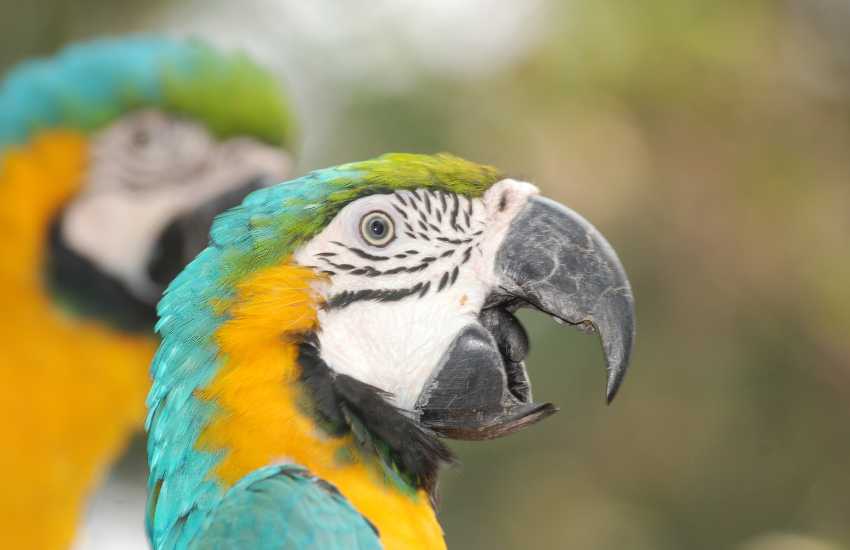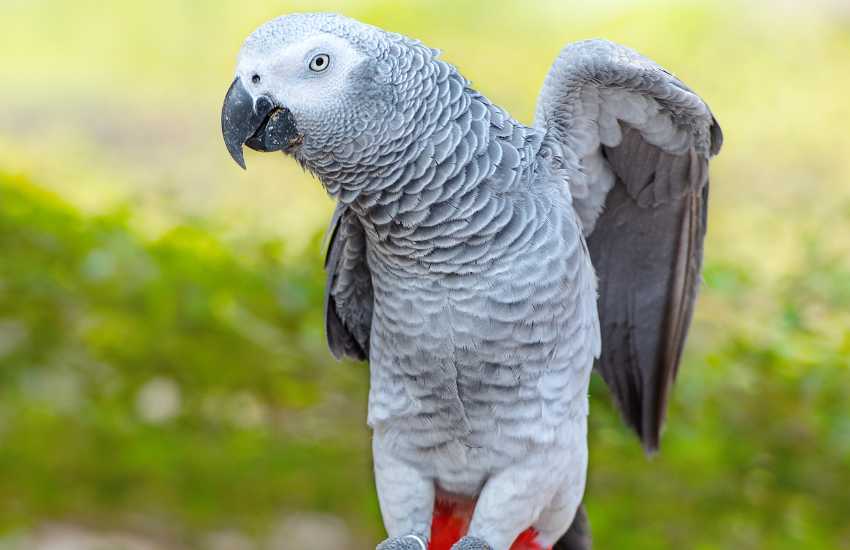Several birds possess vocal prowess and have been known to almost effortlessly mimic human language. Some feathery creatures gifted with the function of mimicry include the raven, crow, and mynah. However, of all the talking birds, there’s none like the parrot species.
African grey parrots have been proven capable of grasping several hundred words. This feature is in itself nothing short of amazing. However, people looking to add pet birds to their human household might wonder, how do parrots speak?
Here, we’ll look at how these birds acquire such an extensive vocabulary. Read on!
How Do Parrots Speak – The Complete Guide
Parrots can speak thanks to their brain structure, allowing cognitive abilities that afford them many vocal learning attributes. As such, the ability of these pet birds to do so well in speech can be definitively broken down into two distinct aspects – the brain region and vocal.
The Brain Region Aspect
The abilities of the songbird, like the African grey parrot, to eloquently mimic human speech has been traced back to their unique brain structure.
This research study discovered that these pet birds had a “song system” in their brain. Such a structure in the brain of the birds indicated that they had a specific portion used for learning and repeating sounds. Psittacus erithacus (African grey parrot) has an even more evolved song system.
This more evolved song system may also be why they have a more extensive vocabulary and can use forms of vocal dialect. This is a trait not seen in many other talking birds.
The Vocal Aspects
Unlike man, domesticated and wild parrots don’t have lips, teeth, vocal cords, or other essential organs that make vocal sound creations.
So, how do parrots speak, then?
Parrots use an organ known as the syrinx to recreate the human speech that we hear from them. Like our larynx, the syrinx has vocal folds. It’s situated at the point where the trachea meets the lungs.
Amazon parrots can freely vibrate their syrinx and imitate everything from word formation to volume and pitch almost perfectly. In some cases, they can go as far as reproducing human accents.
According to another study, it’s also possible that Amazon parrots, African grey parrots, and King parrots recreate the regional and vocal dialects they do, thanks to the action of their tongues.
Do Parrots Understand the Human Speech They Mimic?
No, parrots do not understand the human speech they mimic. The fact that they can perfectly recreate even vocal dialects sometimes is just a glaring testament to the fantastic powers of their vocal learning abilities.
So, the human speech we hear from them can simply be described as a form of parrot language. This is because what it means to us isn’t necessarily what it means to them.
That said, there can be no denying that when the average pet parrot speaks, it appears to have a near-complete grasp of what it’s saying. Parrots apply the human language so aptly that it’s hard to believe they don’t know what they’re saying.
These amazing birds can achieve this because the function of mimicry of parrot brains makes them quite adept at learning context. By extension, they can make the right human sounds at the right time.
The Famous Parrot Alex
The world’s most famous parrot is Alex, an African grey parrot. The owner, Irene Pepperberg, confirmed that these bird species could learn complex concepts. This includes size, numbers, words, locations, and many other details.
Before the ground-breaking work of this inspired pet owner, such high cognitive abilities were common to dolphins and apes.
Considering this, more research has to be done into the African grey parrot species to understand their potential.
What to Know About Why Parrots Speak
Moving through a pet shop now, you can confidently say that you know the answer to the question, “How do parrots speak?”
But, just beyond this, another equally pressing puzzle lies ahead. And that’s the question, why do parrots even speak in the first place?
There are primarily two reasons that compel any parrot to speak. These are:
The Effect of Peer Pressure
Wild parrots place a significant emphasis on social interactions. The primary reason for this is that it affords them many benefits.
When bird species move as a flock, they can avoid predators and forage for food more efficiently. Similarly, they can help each other raise chicks and perform other vital tasks.
For parrots, this is only possible when they can communicate correctly. This peer pressure is what triggers and hones their vocal learning abilities.
When these birds end up in captivity, they tend to start seeing humans as part of their flock and so become compelled to replicate the sounds they hear from our vocal cords.
The Effect of Positive Reinforcement
In some cases, parrot species are explicitly trained to talk. To encourage cooperation from the birds, the feathery creatures are given treats or a form of attention they desire.
Additionally, praise has been confirmed to be a strong incentive that encourages these birds to add to their vocabulary. So, the enthusiasm and praise of pet parrot owners can inspire their birds to do great things.
Bottom Line
If you read to this point, you must have found answers to the question, “how do parrots speak?”
The unique combination of a particular brain structure, the song system, and vocal organs, like the syrinx, allows the parrot to build an extensive vocabulary and recreate human speech. Generally, parrots speak due to peer pressure and positive reinforcement.
With each study, more discoveries continue to be made about the vocal mimicry capabilities of these birds.
See more about welcoming a pet to your home here.


